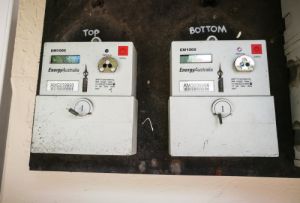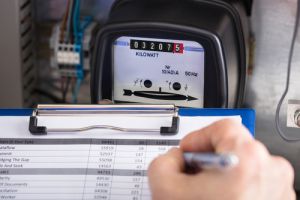Key points
- For those living in South Australia, Tasmania and the ACT, it’s unlikely that you’ll need to pay anything for an electricity meter installation.
- When you request an out-of-cycle meter read, you may be charged a special meter read fee, depending on your provider.
- You may need to upgrade your meter if you install solar panels on your property. Whether you have to pay for this depends on your provider and where you live.
Every home and business connected to the grid has an electricity meter to record their power use. It’s generally the responsibility of retailers to install, read and maintain these energy meters, depending on where you live in Australia.
This Canstar Blue guide takes you through the different charges and fees that you might come across when dealing with an electricity meter at home.
Keep in mind the regulation for metering fees varies considerably across Australia. While this information is correct at the time of writing, regulation and fee schedules are subject to change.
Electric meter installation cost

For residential properties in South Australia, Tasmania and the ACT, installing a standard electricity meter is usually free. The costs of installing a new meter are typically covered by the supply charge component of your power bills, however, extra fees may apply if you need a non-standard meter (e.g. a three-phase connection).
Victorian customers are charged between $400 and $700 upfront for a single-phase smart meter installation, depending on the distributor. In Western Australia, a new electricity meter will set households back around $74 to $250, depending on the type of meter and whether it is being connected to a new or existing home.
In New South Wales, customers are also required to fund the cost of the meter and the upfront installation costs. Since meters in New South Wales are supplied by independent retailers instead of distributors, the price of a new meter can vary considerably, so shop around.
Metering service charge

Queenslanders previously had their metering costs covered as part of their supply charge. However, from July 2018, metering costs in the state are now covered by a ‘metering service charge’. This is a separate charge of about 12c/day that appears on customers’ bills under the ‘other charges’ section.
Customers may be required to pay a higher metering service charge for secondary meters, three-phase meters and solar meters. An additional charge is also included for customers who specifically request to disable the modem of their digital meter to prevent it being read remotely.
Special meter read fee
A special meter reading fee is a charge for having your meter read out of cycle at your own request. Meters are usually read by your retailer every three months (once per quarter) for billing purposes.
If you don’t have a smart meter, someone is required to attend your property to record the electricity usage measured by your meter. These standard meter reads do not incur additional fees. However, if you require a meter read that is off-cycle, then you could be charged a special meter reading fee. This typically happens if you’re changing retailers half way through a billing cycle, however it’s less common in recent years.
Compare Energy Prices
Here are some of the cheapest published deals from the retailers on our database that include a link to the retailer’s website for further details. These are products from referral partners†. These costs are based on the Ausgrid network in Sydney but prices may vary depending on your circumstances. This comparison assumes general energy usage of 3900kWh/year for a residential customer on a single rate tariff. Please use our comparison tool for a specific comparison in your area. Our database may not cover all deals in your area. As always, check all details of any plan directly with the retailer before making a purchase decision.
Here are some of the cheapest published deals from the retailers on our database that include a link to the retailer’s website for further details. These are products from referral partners†. These costs are based on the Citipower network in Melbourne but prices may vary depending on your circumstances. This comparison assumes general energy usage of 4000kWh/year for a residential customer on a single rate tariff. Please use our comparison tool for a specific comparison in your area. Our database may not cover all deals in your area. As always, check all details of any plan directly with the retailer before making a purchase decision.
Here are some of the cheapest published deals from the retailers on our database that include a link to the retailer’s website for further details. These are products from referral partners†. These costs are based on the Energex network in Brisbane but prices may vary depending on your circumstances. This comparison assumes general energy usage of 4600kWh/year for a residential customer on a single rate tariff. Please use our comparison tool for a specific comparison in your area. Our database may not cover all deals in your area. As always, check all details of any plan directly with the retailer before making a purchase decision.
Here are some of the cheapest published deals from the retailers on our database that include a link to the retailer’s website for further details. These are products from referral partners†. These costs are based on the SA Power network in Adelaide but prices may vary depending on your circumstances. This comparison assumes general energy usage of 4000kWh/year for a residential customer on a single rate tariff. Please use our comparison tool for a specific comparison in your area. Our database may not cover all deals in your area. As always, check all details of any plan directly with the retailer before making a purchase decision.
Solar meter installation cost
If you have solar panels, then you require what’s called a ‘bi-directional meter’. While customers in some states can have their meter upgraded for free, others will have to pay a solar meter installation fee.
Solar meter fees in Victoria are often charged upfront in a lump-sum, generally costing around $60. Queenslanders, on the other hand, pay for their solar upgrade through a ‘solar meter charge’. This is similar to the metering service charge where customers pay a few cents each day, listed under other charges.
Other metering fees
Metering fees vary considerably across different networks, so we can’t list them all here. With that said, here are a few other common fees that could apply.
- Meter Inspection Fee: If you’re concerned that your meter is not operating correctly, you can have someone come out to check on it for an additional fee. Any repairs required may also be charged, usually, on a quoted basis.
- Controlled Load Metering Fee: Some meters will require a small upgrade in order to access controlled load tariffs. If that’s the case, additional fees may apply.
- Connection and Disconnection fee: There could be additional connection and disconnection fees that should be factored in. You can read all about these here.
What do I do if I disagree with a metering charge?
If you disagree with a charge on your power bill, then contact your electricity retailer to find out more. In some cases, they may be able to waive the fee, reduce what you owe, or organise an alternative payment arrangement. It is for this reason that it’s important to find an energy company with great customer service. To see who fits that definition, be sure to check out Canstar Blue’s customer ratings.



Share this article